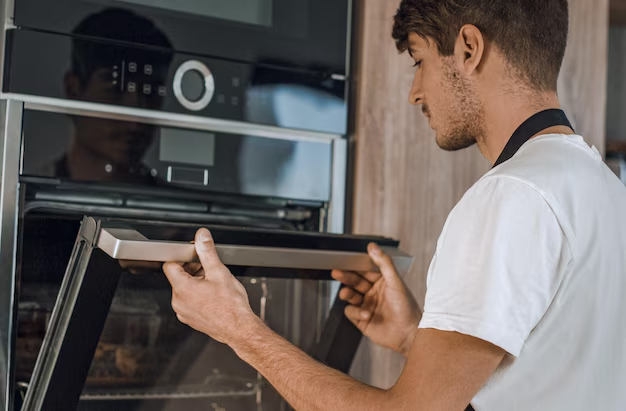Understanding Your Fridge: How Often Should a Refrigerator Run to Stay Efficient?
Opening your fridge is like unlocking a small vault of possibilities: chilled drinks, crispy vegetables, and your late-night snack desires. But have you ever wondered about the hum that quietly punctuates your kitchen? How often should a refrigerator actually run? Understanding this can help optimize both the appliance's efficiency and your electricity bills. Let’s delve into this often-overlooked topic and unveil the dynamics of your fridge’s run cycle.
🍦 How Refrigerators Work: The Cooling Cycle Explained
Refrigerators are marvels of modern engineering, designed to remove heat rather than inject cold air into your food’s domain. The refrigeration cycle is a marvel of thermodynamics involving a few key components:
- Compressor: Acts as the heart, pumping refrigerant through the system.
- Condenser Coils: Release heat and cool down the refrigerant, usually located at the back or bottom of the unit.
- Evaporator Coils: Absorb heat from inside the fridge, cooling the air.
- Thermostat: Sets the desired temperature, initializing the cycle's start.
This elegant loop is why your fridge periodically hums to life. However, there's more beneath the surface, such as frequency and efficiency.
Refrigeration Run Duration: How Often Is Normal?
A refrigerator’s run frequency is influenced by several factors. Typically, a fridge might run anywhere from four to eight hours per day. However, this range isn't set in stone and varies with:
- Ambient Temperature: Warmer environments will prompt more frequent cycles due to increased heat ingress.
- Fridge Load: An empty fridge cycles more often because there’s less thermal mass to retain cool temperatures.
- Door Usage: Frequent opening introduces warm air, increasing the number of cycles.
- Thermostat Settings: Lower temperature settings lead to longer or more frequent runs.
Understanding these parameters can help diagnose if your fridge is behaving normally or if it needs attention.
🌡️ Factors Affecting Refrigerator Compressing Time
Location: Fridges in warmer, humid areas tend to operate more frequently. When the ambient temperature rises, so does your fridge’s effort.
Insulation Quality: Older fridges or those with compromised seals may not maintain cool temperatures efficiently, resulting in increased runtimes.
User Habits: Midnight snack expeditions, frequent ingredient checks, and loading warm leftovers into the fridge can extend its operation time.
Model Specification: Some modern fridges are equipped with more efficient mechanics and insulation, running less frequently than older models.
Diagnosing Run Cycle Concerns
If your refrigerator deviates from the usual cycle duration, here are a few steps to assess potential problems:
Listen for Overheating: A consistently warm motor, despite the fridge remaining closed, could signal overheating or a mechanical issue.
Check for Ice Buildup: Accumulation in the freezer can obstruct airflows or impact the thermostat, leading to extended run times.
Evaluate Power Bills: A sudden spike in energy consumption may allude to inefficient fridge operation.
🛠️ Maintaining Efficiency: Best Practices for Optimal Fridge Performance
To ensure your refrigerator operates efficiently, there are several strategies you can employ:
Temperature Settings: Keep your refrigerator between 37-40°F (2.8-4.4°C) and freezer around 0°F (-18°C). This balance maintains freshness without overstraining the compressor.
Seal Your Fridge: Regularly test door gaskets for air leaks by closing the door on a paper sheet. If you can easily pull it out, it might be time to replace the gasket.
Organize Contents: Arrange the produce and containers to allow optimal air circulation, thus minimizing compressor work.
Reduce Door Opening: Plan your access to minimize warm air intrusion.
Clean the Coils: Dusty coils can impede heat expulsion. Periodically cleaning them helps the fridge maintain efficiency.
Fill It Up — Moderately: Maintaining a balanced load helps stabilization of the internal temperature, which reduces the need for frequent cycling.
👷 Troubleshooting Common Refrigerator Issues
While regular maintenance can help, occasionally some issues may arise. Here’s a rundown of common problems and potential fixes:
Refrigerator Runs Constantly
- Cause: Thermostat failure, blocked condenser coils, or faulty door seals.
- Solution: Check the functionality of the thermostat, clear coils regularly, and replace any ineffective seals.
Refrigerator Stops and Starts Frequently
- Cause: Power surges or thermostat inaccuracies.
- Solution: Install a voltage stabilizer or calibrate the thermostat. Consult the manual for reset procedures.
Insufficient Cooling
- Cause: Poor airflow, faulty cooling fan, or clogged drip pan.
- Solution: Ensure vents are free of obstruction, replace nonfunctional fans, and clear the pan.
Regular checks can prevent these common issues, ensuring your refrigerator runs smoothly and efficiently.
📝 Efficiency Checklist: Keep Your Fridge Running Optimally
Let's sum it up with a handy checklist to keep your fridge healthy:
- 🔍 Monitor Temperature: Maintain the ideal fridge and freezer settings for efficient operation.
- 🧹 Clean Coils: Keep condenser coils dust-free for improved heat dissipation.
- 📏 Check Door Seals: Regularly test gaskets for air leaks and replace as necessary.
- 🚪 Mind the Door: Limit opening and closing—store essentials up front.
- ⚖️ Balance Load: Ensure even distribution of contents for optimal air circulation.
Frost-Free vs. Traditional Fridges: Impact on Running Times
A distinction worth considering is between frost-free and traditional refrigerators. Frost-Free models engage fans and heaters to cycle air and prevent ice buildup, which can subsequently lead to more frequent running: approximately multiple times daily with shorter durations. Traditional models, however, may exhibit prolonged uninterrupted cycles as they don't feature defrost technology.
Final Insight: Harmonizing Function and Efficiency
The hum of your refrigerator is not just background noise—it's the sound of an appliance working to preserve your food efficiently. While the specific frequency and duration of its cycle depend on several factors, understanding them equips you to maintain and optimize your fridge's performance. This ensures not only a smoothly running appliance but also contributes to energy savings over time.
Ultimately, while it may seem trivial, knowing how often your fridge should run goes a long way in harmonizing efficiency, minimizing costs, and prolonging your fridge's lifespan. Here's to a well-running, better-understood kitchen ally!

